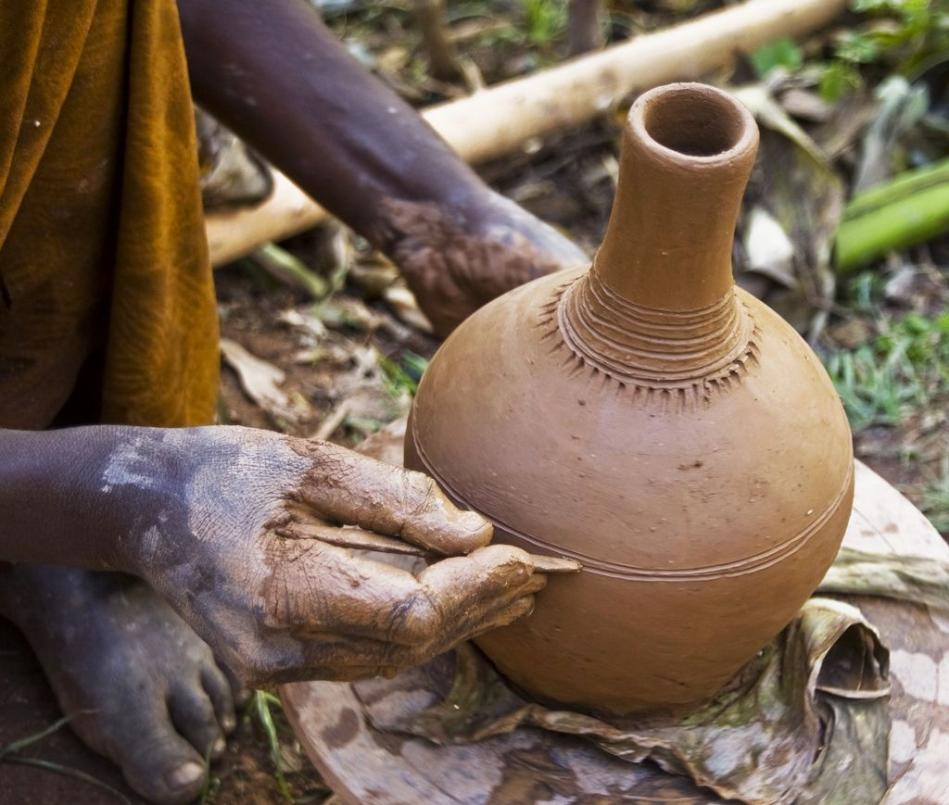Ethiopian Coffee Making Tool Set: A Tradition Steeped in Culture
Ethiopia, often called the birthplace of coffee, has a rich tradition of coffee preparation and consumption. Central to this tradition is a unique set of tools that elevate the coffee-making process into a cultural ceremony. Each item in the Ethiopian coffee-making tool set carries historical and cultural significance, making it an essential part of Ethiopian heritage.

The Essential Tools in an Ethiopian Coffee Ceremony
- Jebena (Coffee Pot)
The Jebena is a distinctive, long-necked clay coffee pot used to brew coffee in Ethiopia. It is traditionally handcrafted from black clay, with a spout for pouring and a round base for heating. The brewing process in a Jebena is slow, allowing the coffee to develop its rich aroma and flavor. The Jebena itself is an art piece, symbolizing Ethiopian craftsmanship. - Cups (Sini)
The coffee cups, known as Sini, are small, handleless cups used to serve the brewed coffee. Typically made of ceramic or porcelain, these cups are often beautifully decorated. The size of the cups encourages slow sipping and enjoyment of the coffee, emphasizing quality over quantity. - Coffee Grinder (Mukecha and Zenezena)
Traditionally, coffee beans are ground manually using a Mukecha (mortar) and Zenezena (pestle). This process not only releases the coffee's natural oils but also connects the preparer with the ritual. The rhythmic pounding is a familiar sound in Ethiopian homes during a coffee ceremony. - Rekebot (Coffee Tray)
The Rekebot is a tray used to organize and display the coffee-making tools and cups. It adds an element of presentation to the ceremony, highlighting the importance of the process and guests' hospitality. - Coal Stove (Makchaya)
Coffee is brewed over a Makchaya, a small coal stove. The open flame allows the coffee to boil gently in the Jebena, ensuring the flavors are perfectly extracted. - Green Coffee Beans and Roasting Pan
Ethiopian coffee ceremonies begin with green coffee beans, which are roasted fresh in a flat pan over the coal stove. The roasting process fills the room with an enticing aroma, signifying the start of the ceremony. - Incense Burner (Mebetchiya)
Incense is burned during the coffee ceremony to create a calming and inviting atmosphere. The Mebetchiya releases fragrant smoke that enhances the sensory experience.
The Process of Ethiopian Coffee Making
The Ethiopian coffee ceremony is a time-honored tradition involving multiple steps:
- Roasting the Beans: Fresh green coffee beans are roasted in a pan until they turn dark brown. The host usually fans the smoke to guests, allowing them to savor the aroma.
- Grinding: The roasted beans are ground using the Mukecha and Zenezena.
- Brewing: The ground coffee is added to the Jebena, mixed with boiling water, and left to brew over the Makchaya.
- Serving: The coffee is poured into the Sini cups in a thin, continuous stream without spilling, a skill mastered by Ethiopian coffee preparers.
Cultural Significance of the Coffee Ceremony
The Ethiopian coffee ceremony is more than a beverage preparation; it is a social and spiritual experience. It brings people together, fostering conversations, strengthening bonds, and often serving as a platform for important discussions. Coffee ceremonies are performed during celebrations, gatherings, and even as a daily household ritual.
Preserving Ethiopian Heritage Through Coffee Tools
Each item in the Ethiopian coffee-making tool set represents centuries of tradition. As globalization spreads, preserving these tools and practices is crucial for maintaining Ethiopia’s cultural identity. Today, these tools are available worldwide, allowing coffee enthusiasts to replicate the Ethiopian coffee ceremony at home and experience the rich heritage.
Final Thoughts
The Ethiopian coffee-making tool set embodies more than utility—it’s a celebration of history, culture, and community. From the earthy aroma of roasted beans to the intricate designs of the Jebena, every detail tells a story. Embracing these tools is not just about making coffee; it’s about immersing oneself in an ancient tradition that continues to inspire the world.
Discover the magic of Ethiopian coffee and its timeless tools.












